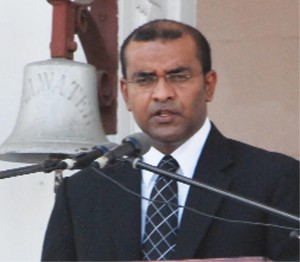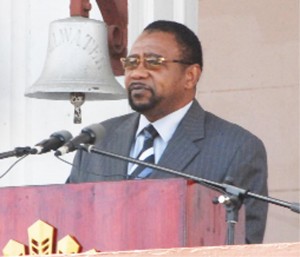Rohee: ‘It’s is no exaggeration to say that the People’s Progressive Party is a living monument to the vision, discipline, energy and organisational skills of Janet Jagan’
Former President Janet Jagan, O.E., was eulogised at an emotionally charged state funeral yesterday with encomiums that ranged from her incomparable patriotism to the country to her inspirational role as a grandmother.

Though she had grown to be a polarizing figure in political circles, Mrs Jagan’s contributions to the nation’s development were given due acknowledgment across the divide, with President Bharrat Jagdeo praising her inspirational leadership and Opposition Leader Robert Corbin urging reflection upon her recognition of the importance of unity. “Janet Jagan represents one of the final examples of political perseverance, possessing an exhaustible political stamina,” Jagdeo said.

By early morning, a few hundred people were lined up outside at the Public Buildings for the state funeral service, paying their final respects to the late former President and former First Lady, who passed away early last Saturday. But for the intense emotional outbursts by a few speakers, including an uncharacteristic breakdown by Home Affairs Minister Clement Rohee, the proceedings were largely sombre and subdued. There were, however, fewer in attendance than were expected, as evidenced by several rows of empty chairs around the compound.
The forecourt was lined by an honour guard after the arrival of the cortege with the body. Mrs Jagan’s body, encased in a casket draped with the Golden Arrowhead and adorned by wreaths, arrived a few minutes after the scheduled 8:30am start time for the service. Pallbearers, including former colleagues from the governing PPP then escorted the casket to a tent in the courtyard. There was no viewing of the body in keeping with Mrs Jagan’s wishes. Looking on from the wings of the Public Buildings gallery were: foreign dignitaries, including a parliamentary delegation from Suriname; MPs from the PPP/C, PNCR-1G, AFC and GAP-ROAR; heads of the disciplined services; senior members of the judiciary; private sector representatives; and other officials. PPP MP Gail Teixeira chaired the ceremony.
President Jagdeo, who paid tribute to Mrs Jagan as an incomparable patriot who was an active advocate for change, noted that for six decades she was a pioneer in the fight for independence, a crusader for the return of democracy and an advocate for human rights and human dignity. In this vein, he singled out her political stamina as being among her most distinguishing traits. “She never wilted in our party’s epic political struggles while in opposition; she was always ready and willing to fight on any and every front to secure the return to democracy and reverse the decline in living standards and stem the abuse of the rights of citizens,” he said.
At the same time, he noted that her politics fundamentally embraced a humanist philosophy, as she was always concerned about the effects of public policy on the lives of the ordinary citizen. Further, she remained committed to offer whatever assistance she could muster without ever craving attention or public accolades for her work.
Strength of character
According to the President, Mrs Jagan’s grit was complemented by her strength of character. Although she endured the most unspeakable of indignities, he observed, she took it all in stride, which was a testimony to her will. She withstood campaigns of misinformation, distortion, public vilification and physical attack, Jagdeo said, suffering for her convictions and making many personal sacrifices. “She never allowed the vile or vicious attacks or her imprisonment or the sacrifices she bore to detract her from her total commitment to Guyana,” he said, adding that she loved the country and its people equally.
Jagdeo also urged members of the PPP to remain faithful to the ideals of the party, which he said remained Mrs Jagan’s most lasting legacy. From the outset the party has been wedded to national unity and working class solidarity, he explained, saying it has been consistent in its quest for national unity, its struggle for the working people, the defence of human rights and its respect for electoral democracy. “The most fitting tribute we can pay to Janet Jagan is to remain faithful to the original ideals of the PPP, she would ask of nothing less from us,” he said, adding that she reached the pinnacle of public service and served the country without counting the cost.
Opposition Leader Robert Corbin acknowledged Mrs Jagan’s sacrifice for the nation, noting that her role in the fight for independence and advancing women’s rights were evidence of a legacy of rich service. Recalling those campaigners who led the struggle for independence, including Mrs Jagan, he emphasised the importance of keeping unity in mind. “…We cannot lose sight of the fact of the early recognition of the truth so well understood but difficult to achieve-that in unity there is strength. United we stand. Divided we fall,” he said. Further, Corbin added that reflection on her passing should also be accompanied by a focus on the need for unity and to secure a significant contribution by all to ensure the advancement of the country. “I trust we can use this occasion to put in place what is necessary to move Guyana forward,” he said.
PPP/C General Secretary Donald Ramotar noted that Mrs Jagan formed the PPP as a tool to organise the people, while recognising the important role it had to play in bringing betterment. As a result, he said she dedicated her life to building it and keeping it strong and united. Her name and work would endure, added Ramotar, who noted that though she was a shy woman she never shied away from her responsibilities and led by example, in the areas of political advocacy, women’s rights and the worker’s struggle. In particular, he stressed the symbolism of Jagan’s role in the fight against colonialism. The British colonialists, he noted, were the first to try to try and demonize her. “…Perhaps because she was White and she was working among the ordinary people of this country, demystifying and destroying the myth of racial superiority,” he said, “She was probably the most potent weapon in that regard, and that is why they sought to demonize her.” Nevertheless, he added, she bore all adversity with dignity and despite the hurt she endured she did not have a single personal enemy.
Subterfuges
Home Affairs Minister Clement Rohee, who delivered the eulogy, noted Mrs Jagan’s work to strengthen and consolidate the party during its early years, while ensuring unity and cohesion at all levels. “It’s is no exaggeration to say that the People’s Progressive Party is a living monument to the vision, discipline, energy and organisational skills of Janet Jagan,” he said.
While recounting her ascension to the highest office of the land in 1997, Rohee noted that the accompanying unrest proved to be even more testing than her initial struggles in the 1950s and 1960s. He described the period of her presidency as one of the most painful periods in her political life as well as the life of the party. “For it was during this period that the vilest and wickedest forms of protest, including public recourse to obeah, political manoeuvres and subterfuges were used in an effort to dislodge her from office, eventuating in the reduction of her term by two years,” he said. “This undoubtedly contributed to her illness but she bore the indignity with dignity, the insult with courage and the gamut of indecency with resilience; such was the nature of the woman.”
At this point, there was a tremor in Rohee’s voice as his eyes welled up with tears and he began to sob. “For a woman who struggled all her life for the advancement of our country, our people and for future generations, to have been treated in this manner, the only decent thing for those who are guilty… of these acts… to do… would be for them, to offer her, even in death, an apology in their quiet moments… for what they did to her, while she was alive,” he said. “And for those, who to this day, never, ever recognized her presidency, only history would prove otherwise, [she was] held in high esteem by her party, its members and supporters, as well as well-wishers, coming from every nook and cranny, and from every stratum of her beloved Guyana-the country which comrade Janet unreservedly and devotedly held as her home…”
He only barely managed to complete the eulogy with composure, his voice cracking as he recited Martin Carter’s “Death of a Comrade.”
“I miss her terribly, her family will miss her,” said Jagan’s daughter, Nadira Jagan-Brancier, breaking down into tears, “I know everyone who had the joy to have met her and really knew her will also miss her.”
Mrs Jagan’s granddaughter, Vrinda, also struggled to keep her composure during her tribute, noting that she was her inspiration and motivation. She described her grandmother as “an unmoveable force who stood up for the rights of women, the underprivileged, children and anyone without a voice,” setting exceptionally high standards for the family.
Her grandmother, she said, taught her the necessity of persistence and never to give up on her dreams. Moreover, Vrinda noted, she also learned that she was not inferior because she is a woman, especially in light of her grandmother’s courage to rise up and give the women of the country hope.
She added that her grandparents also helped demonstrate that men and women could stand side by side and struggle for what is right in a world that has propagated the subordination of women. Vrinda, who was present at the state funeral held for her grandfather at the Public Buildings, lost her composure as she noted that on that occasion Mrs Jagan has lost the true love of her life. “In all of this sadness, I find a bit of peace knowing that they are together again.”
Vrinda also disclosed that her grandmother was pleased when she found out she and her brother had joined the PPP, ensuring the Jagan name would live on in Freedom House.
Following the State ceremony, the cortege proceeded to Freedom House for a short ceremony, then on to Babu John where Mrs Jagan was cremated.
Mrs Jagan, who was born in Chicago, Illnois in the US, married Dr Cheddi Jagan on August 5, 1943. She was fervently committed to the marxist/communist ideology and was believed to have played an influential role in his early political development.
She came to British Guiana in December 1943 and worked for 10 years as a dental nurse in Dr Jagan’s clinic. She became immediately involved in the labour struggle and as a member of the first ever union in the colony, the British Guiana Labour Union. She was also the co-founder of the Political Affairs Committee, the precursor to the PPP. Mrs Jagan was elected General Secretary of the PPP when it was founded in 1950 and served in that post until 1970. She was a founder of the Women’s Progressive Organisation and became the first elected woman to the Georgetown city council. She was later one of three women to enter the House of Assembly as a representative of the Essequibo constituency.
Following the suspension of the constitution and the ousting of the government, Mrs Jagan was jailed for six months in 1955 and restricted to Georgetown after her release. When the PPP was returned to power in the 1957 elections she was appointed Minister of Labour, Health and Housing – one of her famous posts. In 1963 she became Minister of Home Affairs but resigned a year later over incidents of violence in Wismar. She became a member of the Elections Commission in 1967 and played an active role in the opposition years during which she played a significant role in Parliament. After the party’s triumph at the 1992 election, Mrs Jagan served for three months as the country’s ambassador to the United Nations.





